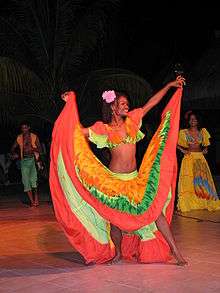Women in Mauritius
As in other industrializing countries, the role of women in Mauritius is changing rapidly. A major force for change has been the rapid influx of women into the many jobs created in the 1980s in the export processing zones. Although low-paying for the most part, the jobs allow women formerly confined to the roles of mother and wife to gain a certain degree of personal and social freedom. One woman, in a 1993 National Geographic article, said: "For a Mauritian woman, to work is to be free. Before, a girl could not leave home until her parents found a husband for her, and then she moved into her husband's family's home and spent the rest of her life having babies. I met my husband at work, and it was my decision to marry him. Now we live in our own house."[2]
 Two female Sega music dancers (center and right) from Mauritius. | |
| Gender Inequality Index | |
|---|---|
| Value | 0.353 (2011) |
| Rank | 63rd |
| Maternal mortality (per 100,000) | 36 (2008) |
| Women in parliament | 18.8% (2011) |
| Females over 25 with secondary education | 45.2% (2010) |
| Women in labour force | 40.8% (2009) |
| Global Gender Gap Index[1] | |
| Value | 0.663 (2018) |
| Rank | 109th out of 149 |
The government has taken measures to promote equality of the sexes by repealing discriminatory laws dealing with inheritance and emigration. In 1989 the government appointed equal opportunity officers in the principal ministries to deal with women's issues. Reports by the Ministry of Women's Rights and Family Welfare and others indicate, however, that violence against women is prevalent. The increased employment of women has created the need for more child-care services and for more laborsaving devices in the home.
In 2016, the Ministry of Gender Equality requested the withdrawal of an advertisement by Coca-Cola which was considered "sexist" following a complaint from a gender consultant. Today, women in Mauritius are more independent than they used to be some 30 years ago. Mauritius also has got its first Lady President, Mrs Ameena Gurib-Fakhim and the first Lady Speaker, Hon.Mrs Maya Hanoomanjee, in 2014. The proportion of students progressing from primary cycle to secondary cycle in 2011 was 79% for boys and 84% for girls. Girls are outperforming boys at higher school level. The proportion of women in the most senior positions (Senior Chief Executive, Permanent Secretary, Deputy Permanent Secretary, Director, Manager, Judge and Magistrate) increased from 23% in 2001 to 40% in 2016.
References
![]()
- "The Global Gender Gap Report 2018" (PDF). World Economic Forum. pp. 10–11.
- McCarry, John (1993). "Mauritius: Island of Quiet Success". National Geographic. 183: 110–132.
- http://defimedia.info/pub-de-coca-cola-le-ministere-de-legalite-des-genres-fait-marche-arriere

.svg.png)